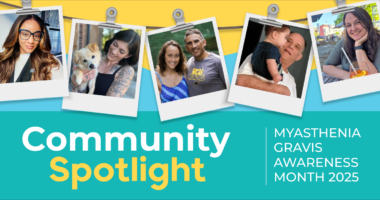Living with myasthenia gravis
Last updated Oct. 30, 2024, by Agata Boxe

A myasthenia gravis (MG) diagnosis can be upsetting, but there are strategies you can learn to help you manage living with MG, a neuromuscular disease that causes muscle weakness and fatigue.
Different types of MG treatment can help control and alleviate disease symptoms that make everyday activities, such as talking and eating, difficult.
Establishing a daily routine, exercising, and nurturing your emotional health can help you maintain a good quality of life.
Although MG is more commonly diagnosed in adulthood, it can affect people of any age. When symptoms begin before age 18, the disease is referred to as juvenile myasthenia gravis.
How does myasthenia gravis affect daily life?
MG can interfere with daily living, given that muscle weakness can worsen within hours, potentially leading to fatigue and issues with vision, mobility, speech, and breathing.
The muscles of the eyes and eyelid are usually the first to be affected by the disease, which can make it hard to see and read.
Ocular symptoms of myasthenia gravis include:
- double vision
- droopy eyelids
- weakness or paralysis of the muscles that control eye movements.
Weakness in the arms and legs is another common symptom that can make everyday tasks, such as walking short distances or carrying shopping bags, more challenging.
There is also a link between myasthenia gravis and breathing problems. If the muscles in the neck or throat are affected, it can be difficult to speak clearly or even breathe. You or a caregiver should call your doctor whenever you are experiencing breathing issues.
Severe breathing issues may occur during a myasthenic crisis, when symptoms suddenly worsen, as the muscles that support breathing become extremely weak. If you think you’re having a myasthenic crisis, it is important that you are treated as soon as possible in a hospital, so call 911 or go to the emergency room.
Creating a daily routine
For people living with MG, creating a daily routine can make a difference. Planning ahead, strategizing, and finding hobbies that are enjoyable may help you cope with the symptoms of myasthenia gravis.
Scheduling regular rest time, both at home and at work, can help you manage fatigue. Shawna Barnes, a military veteran and a website designer in Cable, Wisconsin, was diagnosed with MG in 2018. She says she now typically takes a 10-minute break every hour.
“And when I am extremely fatigued, then it’s a couch day, and I don’t move from the couch,” she says. On those days, her husband brings her food and drinks, and anything else she needs.
Figure out when you usually feel your best — keep track by jotting down the times, or the time of day — and plan to do your most energy-consuming physical activities, such as exercise or cleaning, during that time of day.
Scheduling your meals around those times is also a good idea.
Finally, try to enjoy life. Gardening, painting, reading, or doing puzzles are great ways to relax and boost your emotional resilience.
Eating and drinking
You may find that myasthenia gravis causes you to experience swallowing issues. To address this challenge, diet adjustments may be necessary, in addition to taking medication.
Some tips may help to make eating easier:
- If chewing is tiring, eat softer foods and have smaller meals throughout the day.
- Puree, mash, and chop foods to make them easier to eat.
- Avoid hot foods or warm liquids, which can relax the throat muscles.
- Drink thicker liquids, which may be safer to swallow than thinner drinks.
- Alternate small bites of solid food with small sips of a liquid.
- Have your largest meal earlier in the day, when you have more energy.
- Rest before eating.
Speech and communication
Muscles for breathing and those in the mouth, throat, and neck are often affected in people who have MG, which can lead to difficulties in speaking.
Medications for MG symptoms typically address this problem, but you may want to consider seeing a speech and language pathologist. These therapists can show you how to do muscle-strengthening exercises and offer new approaches or devices for communicating.
Problems with speech and communication may pose unique challenges at work. One solution is to schedule meetings for the times when you usually feel more rested.
Vision problems
Most people with MG, and especially those living with ocular myasthenia gravis, experience vision problems, typically double vision, droopy eyelids, or both.
Double vision is when the eyes cannot move together in a balanced alignment, causing a person to essentially see double images. One or both eyelids may droop to cover all or part of the eye’s pupil, obstructing vision.
Besides medications, other ways to address vision problems include:
- wearing dark glasses in bright light
- using eyelid tape, a special tape that holds the eyelids open without injuring them (or silk tape used at hospitals)
- alternating wearing a patch on one eye
- using magnifying software for computer work
- listening to audiobooks.
You should have your eyes checked regularly. Ask your doctor how often is recommended.
Exercise
Exercise may seem hard to do when you’re dealing with fatigue. Or you may worry that it could make disease symptoms worse. However, evidence suggests that exercise may be good for your physical health, especially when symptoms are mild.
A well-planned exercise program can help you maintain muscle strength and overall endurance.
You should always talk to your doctor before starting a new exercise routine. You may also want to consider working with a physical therapist to be sure that your exercise routine is safe and right for you.
Begin slowly, and build in breaks, and rest periods before and after, to help preserve your energy. Working out with a partner can keep you motivated. And listen to your body: If you are not up to exercising or start to feel tired, then stop.
Barnes says she follows a modified strength training program designed by her husband, a personal trainer and nutrition coach. It focuses on using low weights, resting, and adjusting resistance as necessary.
“I know my limits,” Barnes says. “And if weights are too heavy, then we go to resistance bands.”
Conserving energy and managing fatigue
Learning how to conserve your energy can help you manage symptoms of MG. By weaving breaks and rest times into your routine, you’ll be able to get more done without worsening your symptoms.
Other ways to maintain energy levels include:
- asking for assistance with daily tasks
- wearing a neck brace and eye tape
- resting the eyes when reading or on screens
- sitting down whenever possible
- minimizing long-distance travel
- using a chair lift for house stairs and a lightweight cane for walking
- getting a handicapped parking sticker.
Assistive equipment and home adaptations
Myasthenia gravis walking problems can affect your quality of life. Using assistive equipment and making home adaptations can help you manage potential walking difficulties and balance problems caused by muscle weakness.
If walking problems are an issue, adaptive equipment such as crutches, canes, walkers, and rollators may be of help. Keep in mind some pointers:
- Crutches are best for keeping weight off one leg.
- Canes can help with balance.
- Rollators, which come with wheels, are a good choice when you need only a little bit of assistance with balance.
- Walkers that have four legs and no wheels provide more support than rollators.
Talk to your neurologist or an occupational therapist about which mobility aid is best for you.
You also can consider home adaptations such as:
- removing rugs that can cause you to stumble
- installing a higher toilet and a walk-in shower
- putting grab bars in the shower and by the toilet
- using a plastic chair in the shower
- eating with lightweight plastic plates and silverware.
Emotional and mental well-being
While living with myasthenia gravis may be challenging, taking care of your emotional and mental health can boost your overall wellness.
Building a strong support network is one crucial way to protect your mental well-being, research suggests. For Barnes, that support network is comprised of her husband, her friends, and her dog.
“He is a Great Dane and lab mix,” she says. “A hundred and twenty pounds of gentle giant.”
Barnes also allows herself to feel frustrated. It’s what she recently did after struggling with a leg lift during a workout. (She experiences weakness in her hips, and her left side is much weaker than her right side.)
“I was frustrated and I let myself cry in the middle of the gym with, you know, other people there,” she says.
Barnes practices self-care when tackling such challenges. After that incident, she went to have lunch at her friend’s café. She continued to strategize in her mind about what else she could do to move past the difficult experience. “How can I make it better?” she asked herself.
Ultimately, Barnes takes what she calls a “back to the military” approach to managing how she feels.
“You identify the problem, you identify the solution, and then you come up with a strategy on how to get from point A to point B,” she says.
You also can foster your inner strength by making use of the tools at your disposal. Such tools include:
- exercising if you can
- eating a well-balanced diet
- getting enough sleep
- journaling about your feelings and emotions
- practicing mindfulness and meditation.
Maintaining a solid support network can go a long way. That network can provide opportunities to meet others, including fellow patients and their caregivers, who are dealing with similar challenges.
Your local or regional MG associations and your doctor may be able to recommend community groups.
MG organizations that have support groups or organize community events include:
- the Myasthenia Gravis Foundation of America
- Myaware, in the U.K.
- the Myasthenia Gravis Society of Canada
- The Australian Myasthenic Association in NSW.
The forums on the Myasthenia Gravis News website and the site’s Facebook page are good resources for connecting with others, and a forum on mental health is available.
Myasthenia Gravis News is strictly a news and information website about the disease. It does not provide medical advice, diagnosis, or treatment. This content is not intended to be a substitute for professional medical advice, diagnosis or treatment. Always seek the advice of your physician or other qualified health provider with any questions you may have regarding a medical condition. Never disregard professional medical advice or delay in seeking it because of something you have read on this website.
Recent Posts
- A day in the water is just what the doctor ordered
- How I keep moving forward in life with myasthenia gravis
- Myasthenia gravis gave me something unexpected: A loud voice
- The Importance of Self Advocacy: A Delayed Diagnosis Leads to Years of Uncertainty
- The weight of asking for help; the difference an act of service makes
Related article





